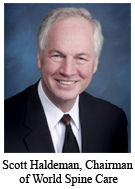Smokers and the obese cheaper to care for, study shows
Source New York Times
Preventing obesity and smoking can save lives, but it does not save money, according to a new report.
It costs more to care for healthy people who live years longer, according to a Dutch study that counters the common perception that preventing obesity would save governments millions of dollars.
“It was a small surprise,” said Pieter van Baal, an economist at the National Institute for Public Health and the Environment in the Netherlands, who led the study. “But it also makes sense. If you live longer, then you cost the health system more.”
In a paper published online Monday in the Public Library of Science Medicine journal, Dutch researchers found that the health costs of thin and healthy people in adulthood are more expensive than those of either fat people or smokers. (more…)


 the inspiration of Scott Haldeman, a leading figure in the assessment and treatment of spinal disorders. World Spine Care has rapidly attracted a world-class leadership team around its vision of universal care for the devastation caused by spinal disorders in the developing world. The Board of Directors includes Elon Musk, co-founder of PayPal, CEO of Tesla Motors and SpaceX, and Chairman of the Musk Foundation. Active participants in the World Spine Care programs include medical physicians, surgeons, physiotherapists, chiropractors, and scientists from Canada and the U.S., with representation from Europe, Asia and Africa.
the inspiration of Scott Haldeman, a leading figure in the assessment and treatment of spinal disorders. World Spine Care has rapidly attracted a world-class leadership team around its vision of universal care for the devastation caused by spinal disorders in the developing world. The Board of Directors includes Elon Musk, co-founder of PayPal, CEO of Tesla Motors and SpaceX, and Chairman of the Musk Foundation. Active participants in the World Spine Care programs include medical physicians, surgeons, physiotherapists, chiropractors, and scientists from Canada and the U.S., with representation from Europe, Asia and Africa.